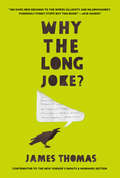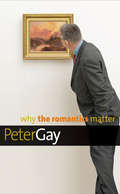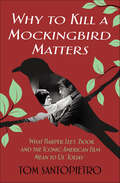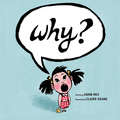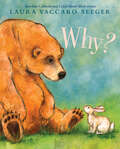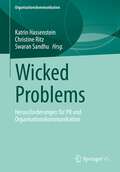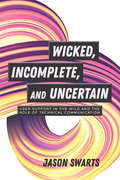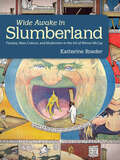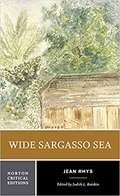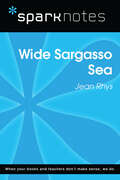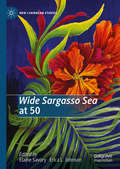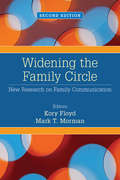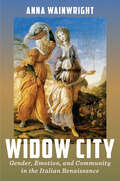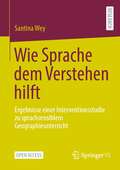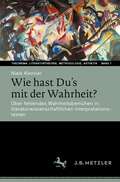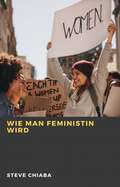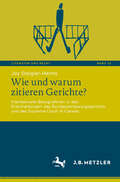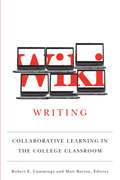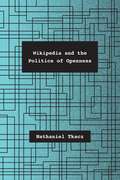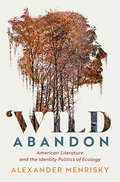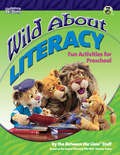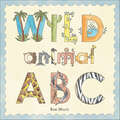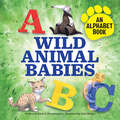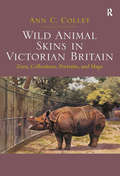- Table View
- List View
Why the Long Joke?
by James ThomasThis is a very silly book. If that's not your thing, then at least buy it for a wayward niece. Inside, you'll find thousands of ideas: dozens of stories, poems, diagrams, lists and cartoons, along with hundreds of jokes and approximations thereof. Is this the funniest book ever published? Well, that's very nice of you to suggest, but at least read it first. James Thomas, what wrote the book, is the elected President of Twitter. But don't let that put you off. He works hard at this nonsense, and has several other irons (books) in the fire (not literally). Why The Long Joke? is the consequence of several years of throwing away Brilliant Material in favor of Ultimate Stupidity. A difficult process, but as you'll see, the results speak for themselves.Inside you'll find countless nuggets of comedy bronze, including "How to Write a Sentence"; "Edgar Allan Poe Goes to a Music Festival"; and "The Three Letters from Saint Paul to the Venusians." Do not, also, miss the author's original illustrations, such as "Dinosaurs of the Future" and "How to Tell If You're Dead"--they're exactly as useful as they sound.
Why the Romantics Matter
by Peter GayWith his usual wit and élan, esteemed historian Peter Gay enters the contentious, long-standing debates over the romantic period. Here, in this concise and inviting volume, he reformulates the definition of romanticism and provides a fresh account of the immense achievements of romantic writers and artists in all media. Gay's scope is wide, his insights sharp. He takes on the recurring questions about how to interpret romantic figures and their works. Who qualifies to be a romantic? What ties together romantic figures who practice in different countries, employ different media, even live in different centuries? How is modernism indebted to romanticism, if at all? Guiding readers through the history of the romantic movement across Britain, France, Germany, and Switzerland, Gay argues that the best way to conceptualize romanticism is to accept its complicated nature and acknowledge that there is no "single basket" to contain it. Gay conceives of romantics in "families," whose individual members share fundamental values but retain unique qualities. He concludes by demonstrating that romanticism extends well into the twentieth century, where its deep and lasting impact may be measured in the work of writers such as T. S. Eliot and Virginia Woolf.
Why to Kill a Mockingbird Matters: What Harper Lee's Book and the Iconic American Film Mean to Us Today
by Tom SantopietroTom Santopietro, an author well-known for his writing about American popular culture, delves into the heart of the beloved classic and shows readers why To Kill a Mockingbird matters more today than ever before.With 40 million copies sold, To Kill a Mockingbird’s poignant but clear eyed examination of human nature has cemented its status as a global classic. Tom Santopietro's new book, Why To Kill a Mockingbird Matters, takes a 360 degree look at the Mockingbird phenomenon both on page and screen.Santopietro traces the writing of To Kill a Mockingbird, the impact of the Pulitzer Prize, and investigates the claims that Lee’s book is actually racist. Here for the first time is the full behind the scenes story regarding the creation of the 1962 film, one which entered the American consciousness in a way that few other films ever have. From the earliest casting sessions to the Oscars and the 50th Anniversary screening at the White House, Santopietro examines exactly what makes the movie and Gregory Peck’s unforgettable performance as Atticus Finch so captivating.As Americans yearn for an end to divisiveness, there is no better time to look at the significance of Harper Lee's book, the film, and all that came after.
Why?
by Adam RexThis sweet book will appeal to anyone familiar with the universal tendency of young children to always ask WHY? When supervillain Doctor X-Ray swoops in threatening to vanquish an innocent crowd, the only one brave enough not to run away is a little girl, who asks him simply, "Why?" He is taken aback—but he answers. She keeps asking. And he keeps answering—until a surprising truth is uncovered, and the villain is thwarted. In this laugh-out-loud take on the small-and-determined-beats-big-loud-bully story, simple questions lead to profound answers in a quest that proves the ultimate power of curiosity.
Why?
by Laura Vaccaro SeegerFor young readers who always want to know why? . . . especially when there isn't an easy answer. An ALA Notable Children's BookA Capitol Choices Noteworthy TitleTwo-time Caldecott and Geisel Honoree Laura Vaccaro Seeger weaves a simple story about the unfailingly curious Rabbit-- and his patient friend Bear, who always answers his questions. Bear just wants to water his flowers, but Rabbit needs to know: why? Bear is looking forward to a peaceful night of stargazing, but all Rabbit cares about is: why? As spring passes into summer, and Rabbit continues to wonder why?, detailed, lush watercolor illustrations encourage the reader to figure out the reason for each question. Over and over, Bear gives the best answers he can-- until, in the depths of winter, he has no answer to give. This simple story is a reminder that even when there are no answers for our questions, we can count on trust and love-- and sometimes, that's more than enough.
Wicked Problems: Herausforderungen für PR und Organisationskommunikation (Organisationskommunikation)
by Katrin Hassenstein Swaran Sandhu Christine RitzPR und Organisationskommunikation müssen zunehmend wicked problems, also verzwickte Probleme, lösen. Ob Digitalisierung, Künstliche Intelligenz oder andere aktuelle Entwicklungen, sie stellen die PR und Organisationskommunikation vor knifflige oder verzwickte Probleme: Für diese kann es keine einfachen Lösungen geben, weil sie sich dynamisch entwickeln und nicht zentral geregelt werden können. Die Beiträge zeigen dies aus unterschiedlichen Perspektiven auf und stellen sich den Herausforderungen von wicked problems auf Mikro-, Meso- und Makroebene sowie auf einer Querschnittsebene.
Wicked, Incomplete, and Uncertain: User Support in the Wild and the Role of Technical Communication
by Jason SwartsTechnology users are compulsive integrators, hybridizers, and bricoleurs, whose unpredictable applications and innovations create a challenging task for support-documentation writers. In Wicked, Incomplete, and Uncertain, Jason Swarts shows how to document technologies that may hybridize into forms that not even their designers would have anticipated and offers insight into the evolving role of a technical writer in an age of increasing user reliance on YouTube tutorials, message boards, and other resources for guidance. Technical writers traditionally create large volumes of idealized tasks and procedures in help documentation, but this is no longer the only approach, or even the best approach. Shifting responsibility for user support to users via crowdsourcing is a risky alternative. Just as with other mass-collaborative enterprises, contributors to a forum may not be aware of the kind of knowledge they are creating or how their contributions connect with those made by others. Wicked, Incomplete, and Uncertain describes the kinds of writing and help practices in which user forums engage, why users seem to find these forums credible and appealing, and what companies can learn about building user communities to support this form of assistance. Through investigation of user-forum activities, Swarts identifies a new set of contributions that technical communicators can make—not only by creating content but also by curating content, shaping conversations, feeding information back into the user community, and opening channels of discovery and knowledge creation that can speak to users and software developers alike
Wide Awake in Slumberland: Fantasy, Mass Culture, and Modernism in the Art of Winsor McCay (Tom Inge Series on Comics Artists)
by Katherine RoederCartoonist Winsor McCay (1869-1934) is rightfully celebrated for the skillful draftmanship and inventive design sense he displayed in the comic strips Little Nemo in Slumberland and Dream of the Rarebit Fiend. McCay crafted narratives of anticipation, abundance, and unfulfilled longing. This book explores McCay's interest in dream imagery in relation to the larger preoccupation with fantasy that dominated the popular culture of early twentieth-century urban America. McCay's role as a pioneer of early comics has been documented; yet, no existing study approaches him and his work from an art historical perspective, giving close readings of individual artworks while situating his output within the larger visual culture and the rise of modernism. From circus posters and vaudeville skits to department store window displays and amusement park rides, McCay found fantastical inspiration in New York City's burgeoning entertainment and retail districts. Wide Awake in Slumberland connects McCay's work to relevant children's literature, advertising, architecture, and motion pictures in order to demonstrate the artist's sophisticated blending and remixing of multiple forms from mass culture. Studying this interconnection in McCay's work and, by extension, the work of other early twentieth-century cartoonists, Roeder traces the web of relationships connecting fantasy, leisure, and consumption. Readings of McCay's drawings and the eighty-one black-and-white and color illustrations reveal a man who was both a ready participant and an incisive critic of the rising culture of fantasy and consumerism.
Wide Sargasso Sea
by Jean Rhys Charlotte Brontë Judith L. RaiskinTextual notes illuminate the novel’s historical background, regional references, and the non-translated Creole and French phrases necessary to fully understand this powerful story. Backgrounds includes a wealth of material on the novel’s long evolution, it connections to Jane Eyre, and Rhys’s biographical impressions of growing up in Dominica. Criticism introduces readers to the critical debates inspired by the novel with a Derek Walcott poem and eleven essays.
Wide Sargasso Sea (SparkNotes Literature Guide Series)
by SparkNotesWide Sargasso Sea (SparkNotes Literature Guide) by Jean Rhys Making the reading experience fun! Created by Harvard students for students everywhere, SparkNotes is a new breed of study guide: smarter, better, faster. Geared to what today's students need to know, SparkNotes provides: *Chapter-by-chapter analysis *Explanations of key themes, motifs, and symbols *A review quiz and essay topicsLively and accessible, these guides are perfect for late-night studying and writing papers
Wide Sargasso Sea at 50 (New Caribbean Studies)
by Erica L. Johnson Elaine SavoryThis book revisits Jean Rhys’s ground-breaking 1966 novel to explore its cultural and artistic influence in the areas of not only literature and literary criticism, but fashion design, visual art, and the theatre as well. Building on symposia that were held in London and New York in 2016 in honour of the novel’s half-century, this collection demonstrates just how timely Rhys’s insights into colonial history, sexual relations, and aesthetics continue to be. The chapters include an extensive interview with novelist Caryl Phillips, who in 2018 published a novel about Rhys’s life, an account of how Wide Sargasso Sea can be read through the lens of the #MeToo Movement, a clothing line inspired by the novel, and new critical directions. As both a celebration and scholarly evaluation, the collection shows how enduring Rhys’s novel is in its continuing literary influence and social commentary.
Widecats Write!: English 101
by The WNC English DepartmentStudents will be able to effectively compose written, oral, and multimedia texts for a variety of scholarly, professional, and creative purposes.
Widening the Family Circle: New Research on Family Communication
by Dr Kory W. Floyd Dr Mark T. MormanWidening the Family Circle: New Research on Family Communication, Second Edition continues to address historically under-studied family relationships, such as those involving grandparents, in-laws, cousins, stepfamilies, and adoptive parents. In this engaging text, editors Kory Floyd and Mark T. Morman bring together a diverse collection of empirical studies, theoretic essays, and critical reviews of literature on communication to constitute a stronger, more complete understanding of communication within the family.
Widow City: Gender, Emotion, and Community in the Italian Renaissance (The Early Modern Exchange)
by Anna WainwrightWidow City: Gender, Emotion, and Community in Renaissance Italy investigates the ever-evolving role of the widow in medieval and early modern Italian literature, from canonical authors such as Dante, Petrarch, and Boccaccio, to the numerous widowed writers who rose to prominence in the sixteenth century—including Vittoria Colonna, Veronica Gambara, and Francesca Turina—and radically changed the conversation on public mourning. Engaging with broader intellectual discussions around gender, the history of emotions, the politics of mourning, and the construction of community, Widow City argues that widows served as key models demonstrating to readers not just how to mourn, but how to live well after devastating loss. At the same time, widows were figures of great anxiety: their status as unattached women, and the public performance of their grief, were viewed as very real threats to the stability of the social order. They are thus key to broader intellectual understandings of community and civic life in the Italian Middle Ages and Renaissance.
Wie Sprache dem Verstehen hilft: Ergebnisse einer Interventionsstudie zu sprachsensiblem Geographieunterricht
by Santina WeyDas vorliegende Open-Access-Buch widmet sich den Desiderata, Design-Kriterien für sprachsensiblen Fachunterricht am Beispiel des Geographieunterrichts zu entwickeln sowie Erkenntnisse über dessen Wirksamkeit hinsichtlich der Zielvariablen Fachwissen und Fachsprache von Schüler*innen zu erlangen. Zusammenhänge zwischen Fachkompetenz und Fachsprache legen nahe, sprachliche Anforderungen in Form von sprachsensiblem Fachunterricht auch in Sachfächern zu adressieren. Im methodischen Rahmen von Design-Based Research werden Design-Kriterien entwickelt, die in einer Unterrichtsreihe operationalisiert und über mehrere Design-Zyklen beforscht werden. Die Datenerhebungen erfolgt je Zyklus im Prä-Post-Follow-up-Design mit Experimental- und Kontrollgruppe. Beide Gruppen behandeln den gleichen Inhalt im gleichen zeitlichen Umfang; als unabhängige Variable wird das Maß an Sprachsensibilität variiert. Zentrale Erkenntnis bezüglich der Effekte des Treatments ist, dass die Experimentalgruppe in Hinblick auf den Erwerb von Fachwissen und Fachsprache statistisch signifikant und mit mittlerer Effektgröße vom sprachsensiblen Geographieunterricht profitiert.
Wie hast Du’s mit der Wahrheit?: Über fehlendes Wahrheitsbemühen in literaturwissenschaftlichen Interpretationstexten (Theorema. Literaturtheorie, Methodologie, Ästhetik #1)
by Niels KlennerSpätestens seit den 1970er Jahren wird die (fehlende) Wissenschaftlichkeit literaturwissenschaftlicher Interpretationen diskutiert – eingefordert werden Klarheit und Stringenz der Argumentation sowie nachvollziehbare Begründungen der aufgestellten Thesen. Ausgehend von der ausführlich anhand verschiedener aktueller Studien zum Sandmann (E.T.A. Hoffmann) belegten Beobachtung, dass es der literaturwissenschaftlichen Interpretationspraxis indes regelmäßig an Wahrheits- bzw. Begründungsbemühen mangelt, argumentiert der Autor, dass dieses fehlende Wahrheitsbemühen in Teilen bullshit im Sinne Harry G. Frankfurts ist: Der Verzicht auf ein Bemühen um wahre Aussagen ist kein Versehen, wird aber gleichzeitig versucht zu verschleiern. Die Studie ist damit ein origineller, analytisch scharfsinniger wie mutiger Beitrag zur Theorie und Praxis des literaturwissenschaftlichen Interpretierens sowie ein wichtiger Anstoß zur Selbstverständigung der Literaturwissenschaft über ihr Kerngeschäft und dessen Standards.
Wie man Feministin wird
by Steve ChiabaA man's guide to modern-day feminism. Have you ever been a victim of violence, hatred, harassment, or suffering as a result of your gender? Being a feminist or practicing feminist ideals means fighting for things that matter. Things such as equal pay, being treated with respect, maternity leave, reproductive rights, domestic violence, among others.
Wie und warum zitieren Gerichte?: Intertextuelle Bezugnahmen in den Entscheidungen des Bundesverfassungsgerichts und des Supreme Court of Canada (Literatur und Recht #12)
by Joy Steigler-HermsGerichtsentscheidungen können ohne Bezugnahmen auf andere Texte weder getroffen noch verfasst werden, Zitate sind in Gerichtsentscheidungen omnipräsent. Jede Entscheidung berücksichtigt einschlägige Normtexte oder Präjudizien, in erster Linie zur Sicherstellung einer kohärenten Rechtsprechung. Durch den Akt des Bezugnehmens demonstrieren Gerichte, dass sie in ihren Entscheidungen auf einer etablierten Rechtsdogmatik aufbauen. Diese Integration in die bestehende Dogmatik legitimiert die Entscheidung und schafft damit Rechtssicherheit durch Rechtsvorhersagbarkeit. In Gerichtsentscheidungen finden sich darüber hinaus Bezugnahmen auf Texte, die nicht über rechtliche Autorität verfügen und denen entsprechend keine derartige Funktion zugeschrieben werden kann. Unter den von Gerichten zitierten Quellen finden sich neben Gesetzestexten z.B. auch Bezüge auf ausländisches Recht, auf wissenschaftliche Quellen oder sogar auf literarische Texte. Die vorliegende Arbeit beschäftigtsich in Anbetracht dessen mit der Frage, wie und warum Gerichte zitieren. Am Beispiel von Entscheidungen des Bundesverfassungsgerichts und des Supreme Court of Canada schlägt die interdisziplinäre Studie sowohl philologische als auch rechtswissenschaftliche Auswertungskriterien zur empirischen Rekonstruktion von Zitatfunktionalisierungen vor und nimmt dabei ferner auch eine komparative Perspektive auf rechtskreisbedingte Unterschiede zwischen den Zitationspraktiken vor Gericht ein.
Wiki Writing: Collaborative Learning in the College Classroom
by Cummings Matt Robert E. BartonWhen most people think of wikis, the first---and usually the only---thing that comes to mind is Wikipedia. The editors ofWiki Writing: Collaborative Learning in the College Classroom, Robert E. Cummings and Matt Barton, have assembled a collection of essays that challenges this common misconception, providing an engaging and helpful array of perspectives on the many pressing theoretical and practical issues that wikis raise. Written in an engaging and accessible manner that will appeal to specialists and novices alike,Wiki Writingdraws on a wealth of practical classroom experiences with wikis to offer a series of richly detailed and concrete suggestions to help educators realize the potential of these new writing environments. Robert E. Cummings began work at Columbus State University in August 2006 as Assistant Professor of English and Director of First-Year Composition. Currently he also serves as the Writing Specialist for CSU's Quality Enhancement Plan, assisting teachers across campus in their efforts to maximize student writing in their curriculum. He recently concluded a three-year research study with the Inter/National Coalition for Electronic Portfolio Research and continues to research in the fields of computers and writing, writing across the curriculum, writing in the disciplines, and curricular reform in higher education. Matt Barton is Assistant Professor, St. Cloud State University, Department of English-Rhetoric and Applied Writing Program. His research interests are rhetoric, new media, and computers and writing. He is the author ofDungeons and Desktops: A History of Computer Role-Playing Gamesand has published in the journalsText and Technology,Computers and Composition,Game Studies, andKairos. He is currently serving as Associate Editor ofKairosnewsand Managing Editor ofArmchair Arcade. "Wiki Writingwill quickly become the standard resource for using wikis in the classroom. " ---Jim Kalmbach, Illinois State Universitydigitalculturebooks is an imprint of the University of Michigan Press and the Scholarly Publishing Office of the University of Michigan Library dedicated to publishing innovative and accessible work exploring new media and its impact on society, culture, and scholarly communication. Visit the website at www. digitalculture. org .
Wikipedia and the Politics of Openness
by Nathaniel TkaczFew virtues are as celebrated in contemporary culture as openness. Rooted in software culture and carrying more than a whiff of Silicon Valley technical utopianism, openness--of decision-making, data, and organizational structure--is seen as the cure for many problems in politics and business. But what does openness mean, and what would a political theory of openness look like? With Wikipedia and the Politics of Openness, Nathaniel Tkacz uses Wikipedia, the most prominent product of open organization, to analyze the theory and politics of openness in practice--and to break its spell. Through discussions of edit wars, article deletion policies, user access levels, and more, Tkacz enables us to see how the key concepts of openness--including collaboration, ad-hocracy, and the splitting of contested projects through "forking”--play out in reality. The resulting book is the richest critical analysis of openness to date, one that roots media theory in messy reality and thereby helps us move beyond the vaporware promises of digital utopians and take the first steps toward truly understanding what openness does, and does not, have to offer.
Wild Abandon: American Literature and the Identity Politics of Ecology (Cambridge Studies in American Literature and Culture #185)
by Alexander MenriskyThe American wilderness narrative, which divides nature from culture, has remained remarkably persistent despite the rise of ecological science, which emphasizes interconnection between these spheres. Wild Abandon considers how ecology's interaction with radical politics of authenticity in the twentieth century has kept that narrative alive in altered form. As ecology gained political momentum in the 1960s and 1970s, many environmentalists combined it with ideas borrowed from psychoanalysis and a variety of identity-based social movements. The result was an identity politics of ecology that framed ecology itself as an authentic identity position repressed by cultural forms, including social differences and even selfhood. Through readings of texts by Edward Abbey, Simon Ortiz, Toni Morrison, Margaret Atwood, and Jon Krakauer, among others, Alexander Menrisky argues that writers have both dramatized and critiqued this tendency, in the process undermining the concept of authenticity altogether and granting insight into alternative histories of identity and environment.
Wild About Literacy: Fun Activities for Preschool (Between the Lions)
by Between the Lion's StaffBetween the Lions®, the Emmy Award-winning PBS KIDS program, brings the joy of reading into millions of homes. From their home at the public library, lion cubs Lionel and Leona and their parents Theo and Cleo introduce children to basic literacy concepts and build the foundations for a lifetime love of reading. Now teachers can bring that same educational fun into the classroom with Wild About Literacy. This books more than 150 activities featureing theme connections, vocabulary, materials and preparation, and extension ideas. Each chapter focuses on one component of literacy so teachers can use a targeted approach to help children learn essential literacy skills. The activities are easy and fun, and they are appropriate for small groups or for children who need one-on-one attention.
Wild Animal ABC
by P. J. HultsFrom Allen the Aardvark to Zack the Zebra, kids are introduced to the alphabet in this whimsically illustrated picture book featuring charming wild animals! With each turn of the page, discover a positive message from A to Z that encourages kindness to old friends and new, while celebrating reading, learning, and creating. The book is filled with original watercolors and simple rhymes, and 26 wild animals with distinct personalities and valuable character traits remind us that simple fun is best, silly is good, and it's important to always be yourself. Join Chester the Chipmunk, Ingrid the Ibis, Wilhelmina the Whale, and all their friends as they bring the ABCs to life. Nonfiction facts and a full spread of all the animals wearing hats add an extra touch of educational fun.
Wild Animal Babies: An Alphabet Book
by Katie T. ChristiansenLearn the alphabet with wild baby animals!—an alphabet book for ages 3 to 5 From sticky-tongued Anteater pups to striped Zebra foals, introduce your 3- to 5-year-old to the alphabet the fun way with some of the most adorable wild animal babies from around the world. Did you know baby Jackrabbits use their jumbo-sized ears to cool off in the hot desert? Or that Rhinoceros calves roll in the mud to protect their skin? Kids will have a blast discovering cool facts on the homes, habits, and family relationships of these lovable wild animals while getting up close and personal with cute and colorful illustrations. This animal-themed alphabet book includes: A is for animal—Your little one will learn the alphabet with one animal for each letter from A-Z plus the name for each baby animal. Adorable artwork—Engaging illustrations invite your child on a memorable journey into the wild world of 26 baby animals. Wildlife facts—From the scrublands of Australia to the rain forests of South America to the savannas of Africa, tiny explorers get to see how each baby animal lives, loves, and grows. Bring the alphabet to life in the wild with the cute and colorful creatures in Wild Animal Babies.
Wild Animal Skins in Victorian Britain: Zoos, Collections, Portraits, and Maps
by Ann C. ColleyWhat did the 13th Earl of Derby, his twenty-two-year-old niece, Manchester’s Belle Vue Zoo, and even some ordinary laborers all have in common? All were avid collectors and exhibitors of exotic, and frequently unruly, specimens. In her study of Britain’s craze for natural history collecting, Ann C. Colley makes extensive use of archival materials to examine the challenges, preoccupations, and disordered circumstances that attended the amassing of specimens from faraway places only vaguely known to the British public. As scientific institutions sent collectors to bring back exotic animals and birds for study and classification by anatomists and zoologist, it soon became apparent that collecting skins rather than live animals or birds was a relatively more manageable endeavor. Colley looks at the collecting, exhibiting, and portraying of animal skins to show their importance as trophies of empire and representations of identity. While a zoo might display skins to promote and glorify Britain’s colonial achievements, Colley suggests that the reality of collecting was characterized more by chaos than imperial order. For example, Edward Lear’s commissioned illustrations of the Earl of Derby’s extensive collection challenge the colonial’s or collector’s commanding gaze, while the Victorian public demonstrated a yearning to connect with their own wildness by touching the skins of animals. Colley concludes with a discussion of the metaphorical uses of wild skins by Gerard Manley Hopkins and other writers, exploring the idea of skin as a locus of memory and touch where one’s past can be traced in the same way that nineteenth-century mapmakers charted a landscape. Throughout the book Colley calls upon recent theories about the nature and function of skin and touch to structure her discussion of the Victorian fascination with wild animal skins.
